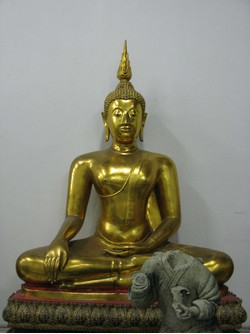Artwork Search
Arts in Southeast Asia Database
The attitude of subduing Mara
Keywords : The attitude of subduing Mara, Buddha image with inscription , Wat Pho, Wat Phra Chetuphon Vimolmangklararm
| Artwork alternative name | The Buddha image with “Tid Sai” inscription |
|---|---|
| Site common name | Wat Phra Chetuphon Vimolmangklararm |
| Site alternative name | Wat Pho |
| Type of artwork | Sculpture |
| Sub district | Phra Borom Maha Ratchawang |
| District | Khet Phra Nakhon |
| Province | Bangkok |
| Region | Central |
| Country | Thailand |
| Geographic Coordinates Decimal degree | Lat : 13.746522 Long : 100.493299 |
| Geographic Coordinates UTM | Zone : 47 P Hemisphere : N E : 661454.02 N : 1520193.27 |
| Place of artwork | Inside the cloister on the northwest of ordination hall. |
| History of production | The creator’s name and the built era are inscribed on its base spectifying “Tid Sai, who has a daughter named Thong Kaew, built this in 1965 BE” |
|---|---|
| Production process | Bronze casting |
| Art | The Buddha image is in the attitude of subduing Mara siting simple cross-legged on the plain base. It has the oval-shaped face. The hair curls are not small, yet not big. The aureole is flame-liked and quite short. It has arched eyebrows. The eyes are partially open gazing low and the outer corners of the eyes are uplifted. It has a hook nose with curvy lips like a wave. The body is well-proportioned. The outer robe is long reaching the navel and its edge is folded like the centipede fangs. The fingers are not equal in length and the index finger is a little bit lifted. The image has Thai alphabet during Rattanakosin period specifying “Sankhalok”, written in Rama I period which means this Buddha image was respectfully engaged from Sawankhalok or Si Satchanalai during the respectful invitation event from Sukhothai. |
| Key academic information | This Sukhothai Buddha image clearly mentionins about the year of construction and the name its creator. |
| Notice | This Buddha image has the same features with many Sukhothai Buddha images that were found along with inscriptions such as the one in cloister from the same temple specifying “Pa Kaw Tong” or the Buddha image in the National Museum specifying “Tid Sa Ngai”. Hence, they could be built in the same period. |
| Period | Historical Period |
| Art period | Sukhothai |
| Age | 20th Buddhist century |
| Religion | Buddhism |
| Religion and belief | Buddhism |
| Related artwork | 1. The Buddha image with “Pa Kao Tong” inscription at Wat Phra Chetuphon Vimolmangklararm has the same features with the Buddha image with “Tid Sai” inscription in all respects. Therefore, they could be built at the same time by the same group of artisan and the creators might be relatives. 2. Though the Sukhothai Buddha image with “Tid Sa Ngai” inscription at Bangkok National Museum does not specify the construction era, it still has the same features with this Buddha image; the inscribed text are sort of the same and the names specifying in the inscriptions are “Tid Sai” and “Tid Sa Ngai” which could be the same person. |
| Type of License | Attribution-NonCommercial-NoDerivs (CC BY-NC-ND) |
|---|---|
| Rights | Princess Maha Chakri Sirindhorn Anthropology Centre |
| Date of record creation | 2016-04-25 |
| Record creator | Rungroj Thamrungraeng and Thanaphat Limhasanaikul |
| Bibliography | Sakchai Saisingha. Buddha Images in Thailand : Styles, Development, and Thai’s Beliefs. Bangkok : Art History sector Faculty of Archaeology Silpakorn University, 2556. Santi Pakdeekham, Rungroj Thamrungraeng, Porpon Suksai. Buddha image of Wat Pho : history and iconography. Bangkok: Amarin Printing & Publishing, 2555. Phiset Jiajanphong. “When students emulate their teachers” Silapawattanatham. Vol. 12, Issue. 2 (December 2533), 50 – 55. Fine Arts, Department. Sukhothai Inscription. Bangkok: Fine Arts Department, 2527. |


